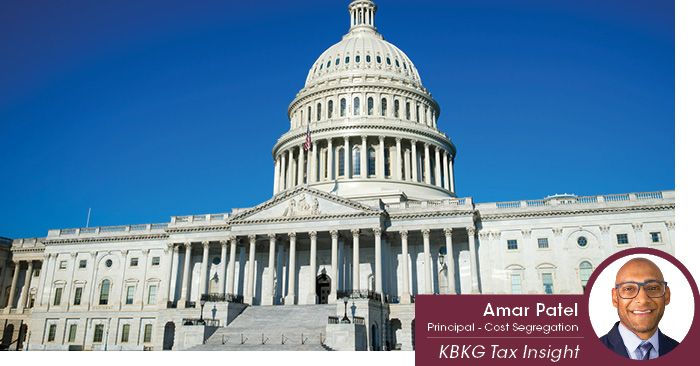By Amar Patel | Principal, Cost Segregation
In a speech to a joint session of Congress, President Trump outlined priority tax legislation expected later this year to restore provisions of the Tax Cuts and Jobs Act (“TCJA”), which includes “providing 100% expensing, retroactive to January 20, 2025”. This leads many to believe that 100% Bonus Depreciation could be an item that Congress strongly considers retroactively reinstating as they draft the tax legislation in the upcoming months.
KBKG Insight:
While 100% expensing generally has bipartisan support, many in Congress are skeptical of what the ultimate details of a tax reform bill will be, as they are concerned about government spending, increases in debt, or cuts to social programs in their districts. 100% expensing is another “cost” that must be paid for somewhere else in tax reform.
Bonus depreciation began to phase down starting in 2023 at 80%, 60% for 2024, and 40% for 2025, and is scheduled to be 20% in 2026, when it will ultimately be phased out beginning in 2027.
What is Bonus Depreciation?
Bonus Depreciation, which is commonly referred to as additional first-year depreciation, is a favorable taxpayer incentive to encourage businesses to invest in qualifying property. Qualifying property includes property used in a trade or business or for the production of income and falls within any of the following categories:
- Is MACRS property that has a recovery period of 20 years or less.
- Qualified improvement property. This includes improvements made to the interior of commercial (“nonresidential”) property after the property was initially placed in service for tax purposes by any taxpayer.
- Computer software.
- Qualified films, television shows, and live theatrical productions.
Impact of 100% Bonus Depreciation
The restoration of 100% bonus depreciation can have several favorable effects:
- Increased investments in capital assets by businesses.
- Economic growth and job creation due to increased demand for business investments.
- Tax savings for businesses that invest in qualifying assets. Significant tax savings and improved cash flows are due to the cash tax savings generated.
Conclusion
President Trump’s comments about retroactive reinstatement of 100% Bonus Depreciation are a significant first step, but ultimately, Congress will need to consider the cost of potential tax cuts during the budget reconciliation process to allow tax legislation to move forward later this year.
KBKG and its experts remain at the forefront of these tax policy changes to provide taxpayers with the most up-to-date information and advice. Businesses and individuals are encouraged to plan for potential legislative tax updates that could reinstate expiring provisions within the TCJA and other tax policies. Those interested in learning more about KBKG and how these potential policy changes could impact your business are encouraged to reach out to its experts below.
About the Author
Amar Patel | Principal – Cost Segregation
Amar spent over 15 years at a Big Four accounting firm, focusing on various specialty tax products, including Cost Recovery Solutions and Research & Development Tax Credits. With more than 20 years of practice, Amar has become an expert in Cost Segregation and Large Fixed Asset Depreciation reviews for purposes of identifying federal, state, and property tax benefits… Read More



